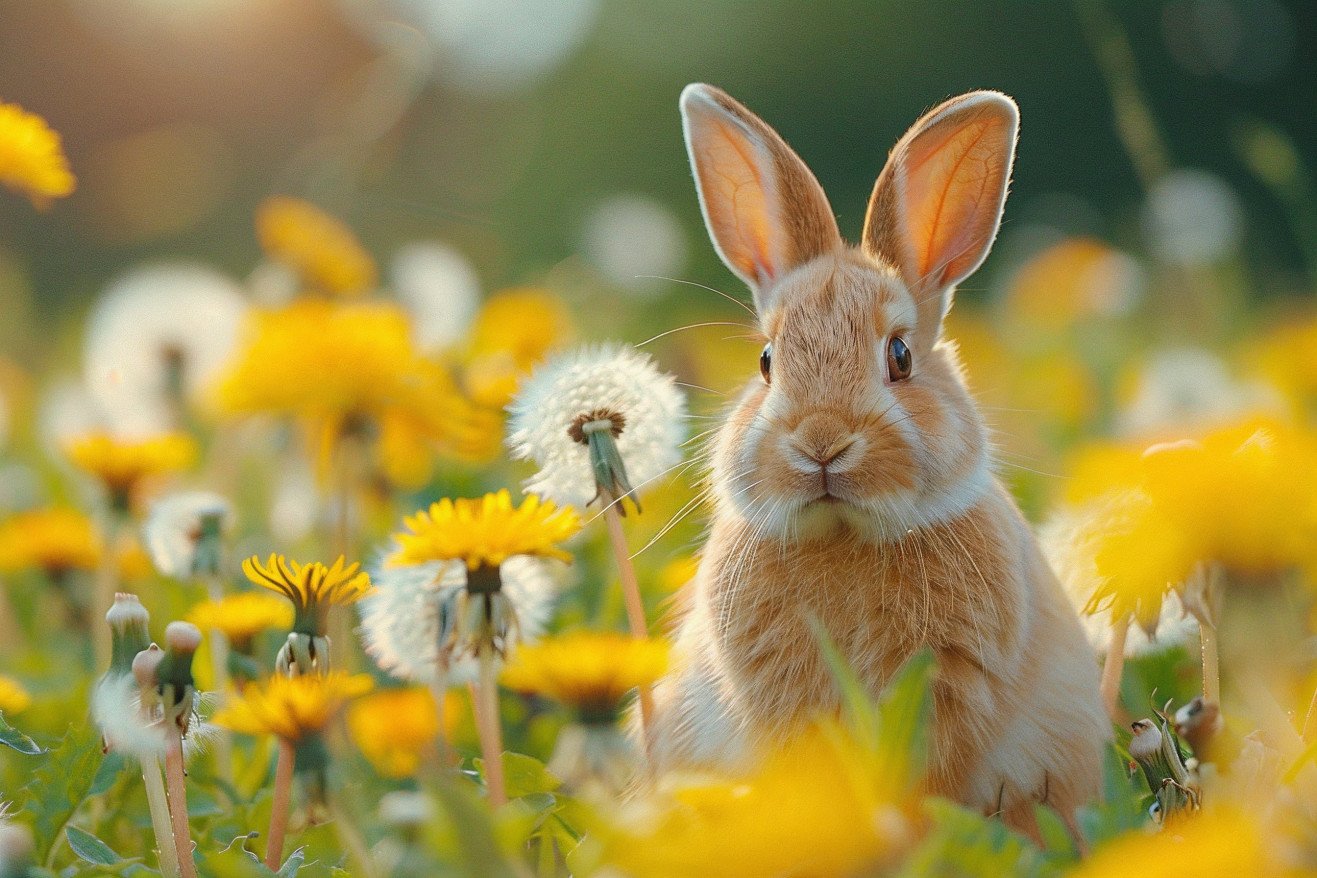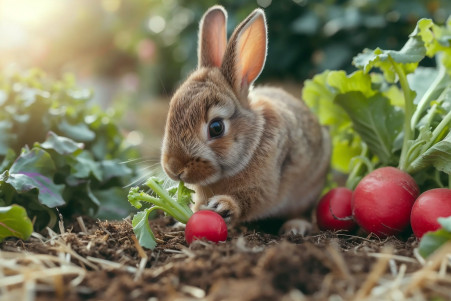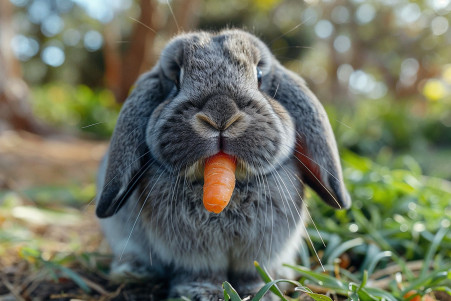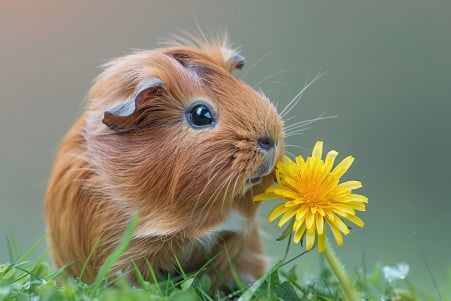Do Rabbits Eat Dandelions? Nutritional Benefits Explored
17 March 2024 • Updated 17 March 2024

The bright yellow flowers of dandelions are a common sight in the spring, and they often lead to the question of whether or not rabbits can eat them. The answer is yes, rabbits can eat dandelions. Dandelions are a good source of vitamins A, C, and K, and minerals like iron, calcium, and potassium. As a result, they can be a healthy part of a rabbit’s diet when eaten in moderation.
This article will dive into the nutritional science of dandelions in a rabbit’s diet by reviewing a number of studies in the fields of veterinary nutrition and botany. It will also look at animal behavior research to better understand the way rabbits eat dandelions in the wild. By the end of the article, you’ll have a well-rounded understanding of how dandelions impact the health and well-being of rabbits.
Can rabbits eat dandelions?
Knowing the Nutritional Needs of Rabbits
As VCA Animal Hospitals explains, rabbits are natural grazers and have a digestive system that is designed to be very efficient. Because of this, a healthy diet for a rabbit is made up of mostly hay, a small portion of fresh vegetables, and specially formulated pellets.
It’s important to make sure that rabbits are eating high-quality grass hay, like timothy, orchard, or brome, to help with digestion and to keep their teeth at the proper length.
Fiber is an extremely important part of a rabbit’s diet. It’s necessary for their unique hindgut fermentation digestive process to work properly. If rabbits eat too many treats, especially those that are high in carbohydrates, it can throw off the balance of their gut microbiome and lead to serious health problems.
Rabbits also need to have access to water at all times to help them digest their food and keep their complex digestive system working properly.
Because rabbits need a diet that is high in fiber and low in fat and protein, dandelions, which are high in fiber and nutrients, can be a good addition to their diet in moderation. When fed in the right amounts, dandelions can add vitamins and minerals to a rabbit’s diet that can help support their health without taking away from their basic dietary needs.
Dandelions: A Nutritional Analysis
Dandelions, or Taraxacum officinale, offer rabbits a wide range of vitamins and minerals. According to Nutrition and You, dandelion greens are especially high in vitamin A, with 100 grams providing 338% of the daily value. Vitamin A is important for maintaining healthy vision and the immune system. They are also high in vitamin C, vitamin K, calcium, and potassium, all of which are important for rabbits.
The antioxidants in dandelions are also important. According to Healthline, dandelions contain beta-carotene and polyphenols, which can help rabbits’ bodies fight free radicals, just as they do in humans. While there is limited research on rabbits, these antioxidants are generally considered to be good for health and may help prevent chronic diseases.
It’s important to note that while dandelions are safe and healthy for rabbits, they should be introduced to the animal’s diet slowly to avoid digestive issues. As with any new food, start with a small amount and watch the rabbit’s reaction.
It’s also important to make sure that the dandelions are pesticide-free. When compared to other vegetables that rabbits often eat, such as lettuce and carrots, dandelions are just as good if not better, making them a great addition to a well-rounded diet.
How to Manage the Risks of Dandelions in a Rabbit’s Diet
While dandelions can be a healthy addition to a rabbit’s diet, it’s important to be mindful of the risks. Allergies and adverse reactions are possible, so it’s important to monitor your rabbit closely after introducing dandelions. According to Frances Harcourt-Brown, rabbits are generally tolerant of plant toxins, but it’s still important to stick to safe amounts; she recommends starting with a few leaves per rabbit per day.
You also need to make sure that the dandelions are free of pesticides and other chemicals. This is especially important because, as the RWAF notes, all house plants should be considered toxic due to treatments, and this includes wild dandelions that may have been exposed to chemicals. It’s best to pick dandelions from areas you know haven’t been treated with pesticides or herbicides.
If a rabbit does have an adverse reaction to dandelions, such as lethargy, gastrointestinal distress, or a change in eating habits, it’s important to get them to a vet right away. While these reactions are rare, a study cited by WabbitWiki showed that early intervention can prevent a mild reaction from turning into a serious problem.
By following these tips, you can make sure that you’re safely adding an occasional dandelion to your rabbit’s diet, allowing them to enjoy the positives without the negatives.
How to Feed Dandelions to Your Rabbit
If you’re thinking about feeding your rabbit dandelions, it’s best to start slow and see how they react. Bunny Approved suggests that you slowly introduce fresh dandelions by mixing them in with your rabbit’s regular hay and leafy greens. Not only does this ensure a well-rounded diet, but it also helps you keep an eye on how your rabbit’s digestive system responds to the new food.
Harcourt-Brown says that it’s important to forage from areas that haven’t been treated with pesticides because rabbits have adapted to eat a wide variety of plants, including dandelions.
If you’re foraging for dandelions, make sure to pick them from an area where they’re growing in abundance and away from roads and other potential pollutants. For people who would rather grow their own, having a small dandelion garden will ensure that you have a constant supply that you know is safe.
A study published in PMC found that the nutritional content of dandelions can change with the seasons, so make sure to take that into account when you’re feeding dandelions to your rabbit. This way, you can make sure that the plants are at their most nutritious and that they haven’t been affected by any environmental factors that could change their quality.
If you do this, you can make sure that you’re giving your rabbit the nutritional benefits of dandelions while also giving them the experience of foraging for their food.
Wild Roots: The Foraging Instincts of Rabbits
Wild rabbits forage for a diet that consists mainly of grasses and other plant materials available in their immediate environment. A guide by Omlet on wild rabbit diets states that these animals feed on grass stems and seedlings near their warrens, providing the essential fiber for their digestive health. Rabbits have adapted to consume a wide variety of plants, such as shoots, roots, leaves, stems, flowers, fruits, and seeds.
In her work, Frances Harcourt-Brown emphasizes the diverse range of wild plants that rabbits are equipped to eat, mirroring the variety and balance of their natural diet. Dandelions are part of this natural medley and are likely a plant that rabbits would naturally seek out due to their nutritional value and availability.
Both innate and learned foraging strategies, as seen in pygmy rabbits and as discussed in the work of Becky Elias, underpin this behavior.
Domestic rabbits have retained many of their wild ancestors’ dietary preferences and digestive systems. Consequently, when caretakers provide dandelions as part of a balanced diet, it aligns with the rabbits’ natural foraging instincts and contributes to a diet that closely mirrors their wild counterparts’ diet. Therefore, including dandelions in a domestic rabbit’s diet is an excellent way to enrich it and honor their natural foraging instincts.
Conclusion: Dandelions and the Rabbit Diet
Throughout this deep dive into the world of dandelions and their potential as a food source for rabbits, we have seen that dandelions are packed with important vitamins A, C, and K, and minerals such as calcium and potassium. Feeding dandelions to rabbits in moderation is a great way to ensure that your pet is getting the nutrients they need.
This has led to a discussion of the importance of moderation in feeding dandelions to rabbits.
Looking at the benefits of feeding dandelions to rabbits, we have also seen the importance of introducing them slowly, making sure they are organic, and making sure to include them as part of a balanced diet that includes hay and fresh vegetables. We have also seen the importance of understanding a rabbit’s natural diet, which has made it clear that dandelions are a great choice for rabbits.
Finally, let’s take a moment to appreciate the importance of understanding a rabbit’s natural diet when making decisions about what to feed them. This is an important part of being a good pet owner and it means that we need to be aware of what we’re feeding our pets and that we need to take their natural preferences into account.
By doing this, we can make sure that we’re feeding our rabbits in a way that supports their health and well-being.


